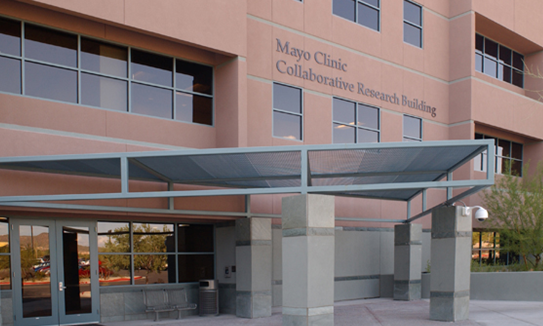PHOENIX — A multicenter study involving Mayo Clinic researchers has found that the National Cancer Institute’s Patient Reported Outcomes version of the Common Terminology Criteria for Adverse Events (PRO-CTCAE), was accurate, reliable and responsive, compared to other, established patient-reported and clinical measures. The study is published today in the journal JAMA Oncology.
“In most cancer clinical trials, information on side effects is collected by providers who have limited time with their patients and current patient questionnaires are limited in scope and depth,” says the study’s lead author Amylou Dueck, Ph.D., a biostatistician on Mayo Clinic’s Arizona campus. PRO-CTCAE is a library of items for patients to directly report on the level of each of their symptoms, to enhance the reporting of side effects in cancer clinical trials which is normally based on information from providers. The study itself is unprecedented as more than 100 distinct questions about symptomatic adverse events were validated simultaneously.”
Researchers recruited more than 1,000 patients from nine clinical practices across the U.S., including seven cancer centers. These patients reflected the geographic, ethnic, racial and economic diversity in cancer clinical trials. Patients in the study also had a wide range of cancer types.
Patients were asked to fill out the PRO-CTCAE questionnaire before appointments. Researchers then compared the patient reports against other established measures of symptoms, including case and quality of life reports, and prescription information.
Researchers were able to validate 119 of 124 PRO-CTCAE questions against established measurement tools. The five questions that were not validated could not be evaluated due to underrepresentation in the study population.
“This is a landmark study demonstrating that meaningful information about adverse events can be elicited from patients themselves, which is a major step for advancing the patient-centeredness of clinical trials,” says the study’s senior author, Ethan Basch, M.D., of Memorial Sloan Kettering Cancer Center and the Lineberger Cancer Center of the University of North Carolina.
PRO-CTCAE is now embedded in a number of clinical trials underway.
###
The study was funded by contracts from the National Cancer Institute.
Co-authors include:
- Tito R. Mendoza, Ph.D., Department of Symptom Research, University of Texas MD Anderson Cancer Center
- Sandra A. Mitchell, Ph.D., CRNP, AOCN, Division of Cancer Control and Population Sciences, National Cancer Institute
- Bryce B. Reeve, Ph.D., UNC Lineberger Cancer Center
- Kathleen M. Castro, RN, M.S., AOCN, Division of Cancer Control and Population Sciences, National Cancer Institute
- Lauren J. Rogak, M.A., Department of Epidemiology and Biostatistics, Memorial Sloan Kettering Cancer Center
- Thomas M. Atkinson, Ph.D., Department of Psychiatry and Behavioral Sciences, Memorial Sloan Kettering Cancer Center
- Antonia V. Bennett, Ph.D., UNC Lineberger Cancer Center
- Andrea M. Denicoff, M.S., RN, ANP, Division of Cancer Treatment and Diagnosis, National Cancer Institute
- Ann M. O’Mara, Ph.D., RN, FAAN, Division of Cancer Prevention, National Cancer Institute
- Yuelin Li, Ph.D., Department of Psychiatry and Behavioral Sciences, Memorial Sloan Kettering Cancer Center
- Steven B. Clauser, M.P.A., Ph.D., Division of Cancer Control and Population Sciences, National Cancer Institute
- Donna M. Bryant, M.S.N., ANP-BC, OCN, CCRC, Department of Clinical Research, Cancer Program, Mary Bird Perkins Our Lady of the Lake Cancer Center
- James D. Bearden III, M.D., FACP, Gibbs Cancer Center & Research Institute
- Theresa A. Gillis, M.D., Helen F. Graham Cancer Center & Research Institute, Christiana Care Health System
- Jay K. Harness, M.D., Center for Cancer Prevention and Treatment, St. Joseph Hospital of Orange
- Robert D. Siegel, M.D., FACP, Helen & Harry Gray Cancer Center, Hartford Hospital
- Diane B. Paul, AAS, a patient advocate and cancer survivor
- Charles S. Cleeland, Ph.D., Department of Symptom Research, University of Texas MD Anderson Cancer Center
- Deborah Schrag, M.D., M.P.H., Division of Population Sciences, Dana-Farber Cancer Institute
- Jeff A. Sloan, Ph.D., Department of Health Sciences Research, Mayo Clinic
- Amy P. Abernethy, M.D., Ph.D., Department of Medicine, Duke University Medical Center
- Deborah W. Bruner, RN, Ph.D., FAAN, Nell Hodgson Woodruff School of Nursing, Emory University
- Lori M. Minasian, M.D., FACP, Division of Cancer Treatment and Diagnosis, National Cancer Institute
About Mayo Clinic Cancer Center
As a leading institution funded by the National Cancer Institute, Mayo Clinic Cancer Center conducts basic, clinical and population science research, translating discoveries into improved methods for prevention, diagnosis, prognosis and therapy. For information on cancer clinical trials, call 1-855-776-0015 (toll-free).
About Mayo Clinic
Mayo Clinic is a nonprofit organization committed to medical research and education, and providing expert, whole-person care to everyone who needs healing. For more information, visit http://mayocl.
MEDIA CONTACT:
Jim McVeigh, Mayo Clinic Public Affairs, 507-284-5005, newsbureau@mayo.edu

